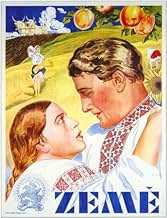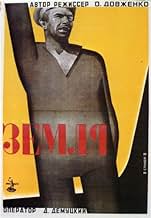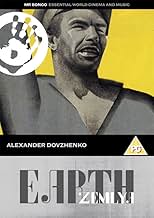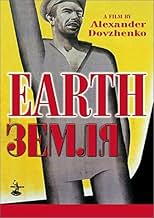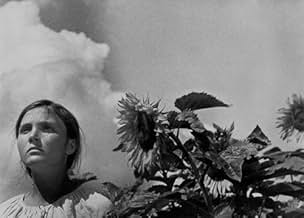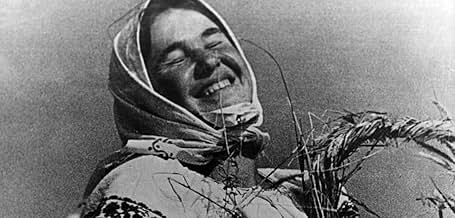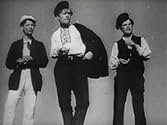ÉVALUATION IMDb
7,2/10
6,7 k
MA NOTE
Dans la campagne paisible, Vassily s'oppose aux riches kulaks contre l'arrivée de l'agriculture collective.Dans la campagne paisible, Vassily s'oppose aux riches kulaks contre l'arrivée de l'agriculture collective.Dans la campagne paisible, Vassily s'oppose aux riches kulaks contre l'arrivée de l'agriculture collective.
- Director
- Writer
- Stars
- Prix
- 1 victoire et 1 nomination au total
Stepan Shkurat
- Opanas
- (as S. Shkurat)
Semyon Svashenko
- Vasyl - son of Opanas
- (as S. Svashenko)
Yuliya Solntseva
- Daughter of Opanas
- (as Yu. Solntseva)
Yelena Maksimova
- Natalya - Vasyl's fiancee
- (as Ye. Maksimova)
Nikolai Nademsky
- Ded Semyon
- (as N. Nademsky)
Ivan Franko
- Kulak Belokon
- (as I. Franko)
Pyotr Masokha
- Khoma - son of kulak Belokon
- (as P. Masokha)
Vladimir Mikhaylov
- Priest
- (as V. Mikhaylov)
Pavel Petrik
- Young Party-Cell Leader
- (as P. Petrik)
P. Umanets
- Chairman of the Village Soviet
- (as Umanets)
Luka Lyashenko
- Young Kulak
- (as L. Lyashenko)
Vasiliy Krasenko
- Old Peter
- (uncredited)
M. Matsyutsia
- Farm Girl
- (uncredited)
Avis en vedette
Like 'The Birth of a Nation' or 'The Triumph of the Will', 'Earth' is a brilliant, groundbreaking film even if morally despicable. And in retrospect of what happened after its release, Stalin's liquidation of millions of Kulaks, its hard not to compare Dovzhenko's Marxism to Reifenstahl's fascism or Griffith's racism. Apologists for all of these filmmakers tell us to 'ignore the story' or 'ignore the propaganda'. Even the Kino DVD introduction instructs us to not take the film literally.
Perhaps instead of asking, 'Can propaganda be art?' the better question is , 'Can art transcend propaganda.' In 'Earth', I think Dovzhenko partially succeeds. The lyrical cycles of birth and death on the Ukrainian steppe are told with visual poetry. In fact, as the film goes on Dovzhenko obviously becomes uninterested in the circumstances of Vasily's murder and martyrdom for the collectivist cause. No doubt, the Soviet regime produced this film to (a) encourage collectivization against private ownership, and (b) Encourage a retro-pagan worship of agrarian life against orthodox Christianity. The collectivist vs. Kulak story in (a) is crude and unconvincing propaganda to a modern audience with historical perspective on Stalin's brutalities in the 1930's. However, it is with the fertile imagery and montage of natural cycles in (b) that Dovzhenko succeeds beautifully and transcends the story and makes it timeless.
Perhaps instead of asking, 'Can propaganda be art?' the better question is , 'Can art transcend propaganda.' In 'Earth', I think Dovzhenko partially succeeds. The lyrical cycles of birth and death on the Ukrainian steppe are told with visual poetry. In fact, as the film goes on Dovzhenko obviously becomes uninterested in the circumstances of Vasily's murder and martyrdom for the collectivist cause. No doubt, the Soviet regime produced this film to (a) encourage collectivization against private ownership, and (b) Encourage a retro-pagan worship of agrarian life against orthodox Christianity. The collectivist vs. Kulak story in (a) is crude and unconvincing propaganda to a modern audience with historical perspective on Stalin's brutalities in the 1930's. However, it is with the fertile imagery and montage of natural cycles in (b) that Dovzhenko succeeds beautifully and transcends the story and makes it timeless.
10Rigor
This great masterpiece of Soviet cinema has images so powerful and an editing technique so bold that at times the narrative is transcended. By this I mean that the film goes beyond it's original intention of arguing for changes from individualistic to more technologized and collective agricultural strategies and becomes a kind of realization of what a "liberated" agricultural zone would really look and feel like. This is a film ripe with the excitement of the creation of a new art to match a hopeful new world. It hardly needs to be mentioned that Stalinsit forces decried the final results of this masterpiece; calling it decadent and stylistically elitist. In actuality the film is too Marxist (I would go so far as to say too Leninist) for Stalinism. The film respects the ability of the viewer (and the viewers were assumed to be proletariat working class and agricultural workers) to grapple with rigorous ideas and images and to function outside of the narrative frame of individualistic melodrama. Like many early Soviet films this work seems not only ahead of its time, but, actually ahead of ours.
What an unusual and memorable film this is, almost more like a poem or an impressionist painting than a movie. It's filled with activity and images that push the actual story into the background. Sometimes the characters overreact to events in a highly exaggerated fashion, while at other times they barely respond to what happens - yet it seems both real and believable. The movie is probably not quite as great as some would have it, but it has an unusual appeal that makes you want to watch it (or, perhaps, experience it) over again.
The scenes often have little connection with one another, and it's clear that the plot is not meant to be the main emphasis. On the surface, the story is about the collective farm, their hopes of getting new machinery, and their rivalry with the independent landowners. But it's intended to be something more subtle and worthwhile than a political message. The themes and images involving the characters and, especially, the "Earth" itself, are more vivid than the slight story-line.
To be sure, the collectivist perspective from which the film was made is rather obvious. But that does not detract from this unusual achievement. And while it would not work as light or casual entertainment, it is well worth watching, and it's a movie you won't forget afterwards.
The scenes often have little connection with one another, and it's clear that the plot is not meant to be the main emphasis. On the surface, the story is about the collective farm, their hopes of getting new machinery, and their rivalry with the independent landowners. But it's intended to be something more subtle and worthwhile than a political message. The themes and images involving the characters and, especially, the "Earth" itself, are more vivid than the slight story-line.
To be sure, the collectivist perspective from which the film was made is rather obvious. But that does not detract from this unusual achievement. And while it would not work as light or casual entertainment, it is well worth watching, and it's a movie you won't forget afterwards.
This is one of those "critics' darlings" titles that frequently crops up in "All-Time Best Films" polls; however, it is also one which certainly seems to have lost its edge with the passage of time. While I am generally a fan of politically-themed movies, I have always admired the early Russian classics for their pioneering use of film language but found them oppressively heavy-going viewing overall. This belated Silent is considered to be its director's masterwork and, despite the brevity of its running time (70 minutes), this standard opinion holds true regardless, notwithstanding the relative simplicity of its plot: tragedy strikes a farming community when oncoming progress (the use of a new tractor to plough the land in place of the old horse-driven method) divides it into two factions.
The intertitles on the copy I acquired (taken from the Kino DVD) are stiltedly Americanized and the acting style is typically hammy; what ultimately saves the film and preserves its reputation as a precious cinematic document are the strikingly lyrical compositions – highlighted by the extended funeral sequence of the murdered tractor driver which is powerfully intercut with the breakdown of the killer in a field, the lonely naked wife of the murdered man in the throes of sexual frenzy, a middle-aged villager going through labor pains, an elderly priest invoking a curse upon the godless community that has shunned him and an impromptu political rally by the mourners!
The intertitles on the copy I acquired (taken from the Kino DVD) are stiltedly Americanized and the acting style is typically hammy; what ultimately saves the film and preserves its reputation as a precious cinematic document are the strikingly lyrical compositions – highlighted by the extended funeral sequence of the murdered tractor driver which is powerfully intercut with the breakdown of the killer in a field, the lonely naked wife of the murdered man in the throes of sexual frenzy, a middle-aged villager going through labor pains, an elderly priest invoking a curse upon the godless community that has shunned him and an impromptu political rally by the mourners!
Now I regret all the times I've railed about how propaganda is synonymous with contempt for the audience. It is sometimes hard to know what to say about a movie when it is a 'best of all time list' warhorse, but not this time. I have never - ever - seen a movie with a more deliberate, or surer, sense of rhythm. Two sequences that are nothing but long montages of fruit are absolutely riveting. A man sits, re-evaluating his world view, and because it takes a long time to do that we fade to black THREE times over about a minute, without him moving or changing position. This glacial tempo lulls us, so that Dovzhenko can jolt us with the arrival of a speedy tractor; or a collectivo's joyous dance through the dust over several lengthy wide shots is disrupted by his abrupt murder. Then the movie climaxes with an unbelievable crescendo where at least FIVE events are montaged, in perfectly comprehensible rhetorical construction. The movie begins with a death scene whose understated acting is mind-boggling even now, forget 1930; the final shot balances all the anti-church rhetoric with an image that is absolutely redemptive and spiritual, only the point is that redemption is found in LIFE. I'm not being pompous, this movie actually functions on that level. It achieves poetry AND propaganda in a way that I've never ever experienced before. It kind of reminds me of Brian Wilson's "Smile" in its modest grandeur, so true that it's painful, but so f***ing great that you want to experience it again and again. You can get it for free at the St. Catharines Library.
Le saviez-vous
- AnecdotesSoviet censors made Aleksandr Dovzhenko eliminate a number of scenes from the film, including the scene of peasants urinating into a tractor radiator, and the scene of nude woman mourning over her dead fiance. The original uncut version was screened in Ukrainian republic when first released, and then in the Museum of Modern Art (New York City, USA) about 40 years later, on 10 October 1969.
- Autres versionsIn 1997, the film was re-released in Germany by ZDF, with a new score composed by Alexander Popov. This version was digitally improved (known as Arte Edition), then released on DVD and distributed by the absolut MEDIEN GmbH in 2006. The running time is 78 minutes. The crew participants:
- Alexander Popov, Composer;
- Frank Strobel, Conductor;
- Evgeniy Nikulskiy, Sound engineer;
- Nina Goslar, Commissioning editor.
- ConnexionsEdited into Le tombeau d'Alexandre (1993)
Meilleurs choix
Connectez-vous pour évaluer et surveiller les recommandations personnalisées
- How long is Earth?Propulsé par Alexa
Détails
- Durée1 heure 15 minutes
- Mixage
- Rapport de forme
- 1.33 : 1
Contribuer à cette page
Suggérer une modification ou ajouter du contenu manquant



